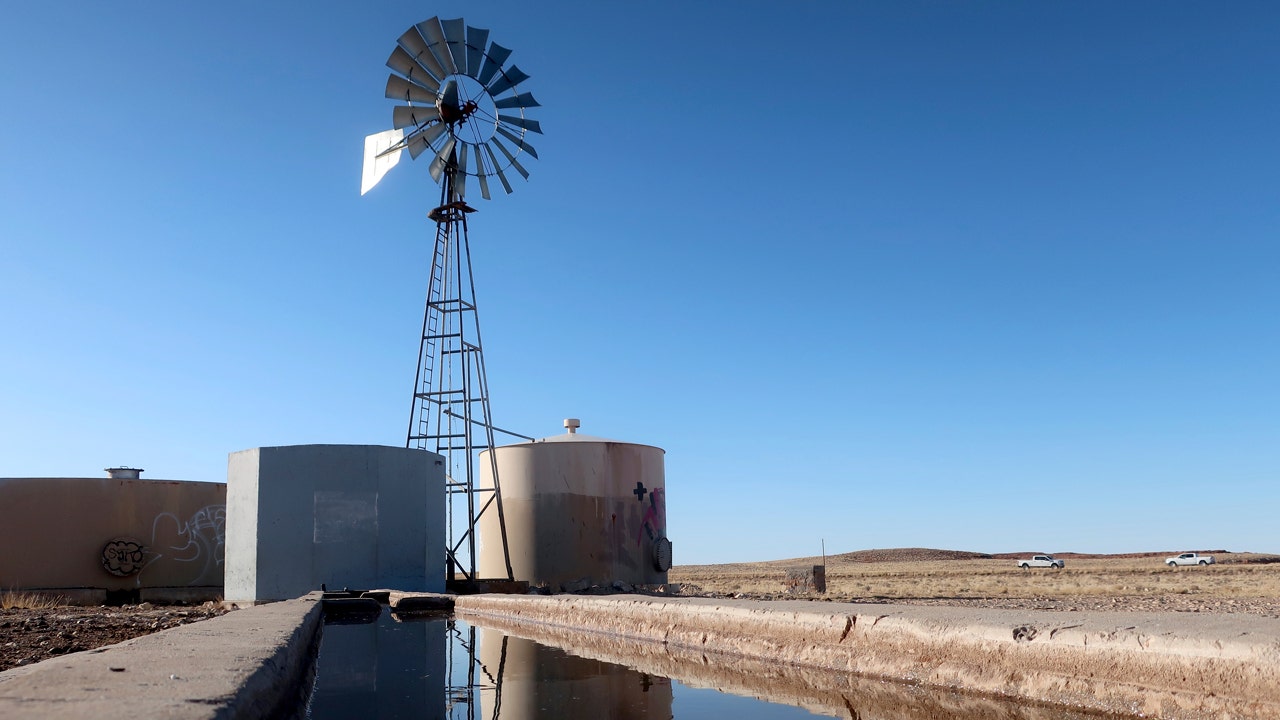Southwest
Native American tribes unanimously approve Colorado River water rights proposal that would cost Congress $5B

- The Navajo Nation Council has unanimously approved a proposed water rights settlement. The Navajo, Hopi and San Juan Southern Paiute tribes are seeking more than $5 billion as part of their settlement, more than any such agreement enacted by Congress.
- The Navajo Nation has one of the largest single outstanding claims in the Colorado River basin and has worked for generations to secure water deliveries for tribal communities.
- Nearly a third of homes in the Navajo Nation don’t have running water. Many homes on Hopi lands are similarly situated.
The Navajo Nation Council has signed off on a proposed settlement that would ensure water rights for its tribe and two others in the drought-stricken Southwest — a deal that could become the most expensive enacted by Congress.
The Navajo Nation has one of the largest single outstanding claims in the Colorado River basin. Delegates acknowledged the gravity of their vote Thursday and stood to applause after casting a unanimous vote. Many noted that the effort to secure water deliveries for tribal communities has spanned generations.
Council Speaker Crystalyne Curley and other officials stood outside the chamber in Window Rock, Arizona, under a clear blue sky as the wind whipped. She recalled learning about the fight over water rights in school when she was a girl.
BIDEN DOJ SIDES WITH NATIVE AMERICAN TRIBE IN COURT FILING RIPPING CANADIAN PIPELINE AS TRESPASSING
Momentous is how she described the day, before she put her pen to the legislation and nearby vehicles honked their horns in celebration.
“This is an opportunity to think 100 years ahead for our children,” said Curley, a mother and soon-to-be grandmother.
“The time is now and we have to make our footing for the future,” she continued.
A windmill draws water for livestock in Leupp, Arizona, on the Navajo Nation, on March 9, 2024. In a vote on May 23, 2024, the Navajo Nation Council unanimously approved a proposed water rights settlement that carries a price tag larger than any such agreement enacted by Congress. (AP Photo/Felicia Fonseca, File)
The San Juan Southern Paiute Tribal Council also voted to approve the settlement Thursday, while the Hopi tribe approved it earlier this week. Congress will have the final say.
For Hopi, the settlement is a path to ensuring a reliable water supply and infrastructure for the health, well-being and economic prosperity of the tribe for generations to come, Hopi said in a statement late Thursday.
“Most importantly, this settlement provides a way for Hopi to fulfill its covenant with Maasaw (guardian) to live as stewards of Hopitutskwa (Hopi land),” the statement read.
Congress has enacted nearly three dozen tribal water rights settlements across the U.S. over the last four decades and federal negotiation teams are working on another 22 agreements involving dozens of tribes. In this case, the Navajo, Hopi and San Juan Southern Paiute tribes are seeking more than $5 billion as part of their settlement.
About $1.75 billion of that would fund a pipeline from Lake Powell, one of the two largest reservoirs in the Colorado River system, on the Arizona-Utah border. The settlement would require the U.S. Bureau of Reclamation to complete the project by the end of 2040.
From there, water would be delivered to dozens of tribal communities in remote areas.
Nearly a third of homes in the Navajo Nation — spanning 27,000 square miles of Arizona, New Mexico and Utah — don’t have running water. Many homes on Hopi lands are similarly situated.
Navajo President Buu Nygren plans to sign the settlement legislation as soon as it hits his desk, likely Friday. He told The Associated Press it had been a long road to get everyone to the table and the next step will be knocking on the doors of Congress.
A century ago, tribes were left out of a landmark 1922 agreement that divided the Colorado River basin water among seven Western states. Now, the tribes are seeking water from a mix of sources: the Colorado River, the Little Colorado River, aquifers and washes on tribal lands in northeastern Arizona.
The latest settlement talks were driven in part by worsening impacts from climate change and demands on the river like those that have allowed Phoenix, Las Vegas and other desert cities to thrive. The Navajo, Hopi and San Juan Southern Paiute tribes are hoping to close the deal quickly under a Democratic administration in Arizona and with Joe Biden as president.
Without a settlement, the tribes would be at the mercy of courts. Already, the U.S. Supreme Court has ruled that the federal government is not bound by treaties with the Navajo Nation to secure water for the tribe. Navajo has the largest land base of any of the 574 federally recognized tribes and is second in population with more than 400,000 citizens.
A separate case that has played out over decades in Arizona over the Little Colorado River basin will likely result in far less water than the Navajo Nation says it needs because the tribe has to prove it has historically used the water. That’s hard to do when the tribe hasn’t had access to much of it, Navajo Attorney General Ethel Branch has said.
Arizona — situated in the Colorado River’s Lower Basin with California, Nevada and Mexico — is unique in that it also has an allocation in the Upper Basin. The state would get certainty in the amount of water available as it’s forced to cut back as the overall supply diminishes.
Navajo and Hopi, like other Arizona tribes, could be part of that solution if they secure the right to lease water within the state that could be delivered through a canal system that already serves metropolitan Tucson and Phoenix.
Arizona water officials have said the leasing authority is a key component of the settlement.
Read the full article from Here

Southwest
Trump introduces Cornyn, Paxton but stays mum on endorsement in heated GOP primary

NEWYou can now listen to Fox News articles!
The Texas Senate primary for Republicans is a bloodbath, and President Donald Trump isn’t wading in.
Trump, who appeared in Corpus Christi, Texas, to tout his energy agenda Friday, had the opportunity to stake his claim in the contentious race and endorse a candidate.
Sen. John Cornyn, R-Texas, is the longtime incumbent fending off seven challengers.
But the real race is between Cornyn, Texas Attorney General Ken Paxton and Rep. Wesley Hunt, R-Texas.
President Donald Trump stops to speak to the media as he departs from Marine One on the South Lawn of the White House Feb. 27, 2026, in Washington, D.C. ( Heather Diehl/Getty Images)
All three were in attendance at Trump’s rally, reminiscent of the made-for-TV spectacles that dominated his successful 2024 election campaign. Yet Trump didn’t endorse any of them as Election Day in the primary fast approaches.
Trump acknowledged all three — he paired Cornyn and Paxton and mentioned Hunt later in his remarks. He noted that they were all engaged in an “interesting election.”
“They’re in a little race together,” Trump said of Cornyn and Paxton. “You know that, right? A little bit of a race. It’s going to be an interesting one, right? They’re both great people, too.”
HUNT FILES POLICE REPORT AGAINST CORNYN CAMPAIGN STAFFER OVER ALLEGED FAMILY ‘DOXXING’ INCIDENT
Texas Attorney General Ken Paxton and John Cornyn, R-Texas (Getty Images)
Cornyn is running for a fifth term in the Senate and fighting for his political life in a nasty primary election that Trump has time and again refused to weigh in on. He’s got the full weight of Senate Republican leadership behind him, too.
Paxton, who has faced headwinds with scandals over the years, has strongly aligned himself with the president and built a coalition of conservative backers in the House, including Rep. Troy Nehls, R-Texas, who brought him to Trump’s State of the Union earlier this week.
And while the trio duke it out, money is being burned at a record pace. So far, a whopping $110 million has been spent on the Senate primaries, and $88 million of that has been dumped into the GOP contest, according to data from AdImpact.
CORNYN WARNS PAXTON WOULD BE ‘KISS OF DEATH’ FOR GOP AS BLOODY PRIMARY RACE RAMPS UP
Rep. Wesley Hunt, R-Texas, walks up the House steps for a vote on the budget resolution in the U.S. Capitol April 10, 2025. (Bill Clark/CQ-Roll Call, Inc via Getty Images)
Given the crowded field, it’s likely the race will head to a runoff, which will turn into a brutal sprint until late May. Paxton believes he could come out on top with at least 50% of the vote come March 3, while Cornyn is eying the long game.
The coveted Trump endorsement could put either over the top in ruby red Texas. And he may be close to picking his favorite.
Ahead of the event, Trump was asked if he had decided who to endorse.
CLICK HERE TO DOWNLOAD THE FOX NEWS APP
“Pretty much,” he told reporters.
But when asked if he would say who, he said, “No.”
Read the full article from Here
Southwest
Jasmine Crockett reveals Colbert hasn’t invited her on show since furor over Talarico interview

NEWYou can now listen to Fox News articles!
Rep. Jasmine Crockett, D-Texas, revealed Friday she’s still not been asked to appear on Stephen Colbert’s “Late Show,” days after the host claimed pressure from the Federal Communications Commission effectively censored an interview with her Senate primary political opponent, James Talarico.
Earlier this week, Colbert said CBS prevented the broadcast of Talarico’s appearance due to guidance from the FCC requiring shows to provide “equal time” to opposing candidates.
In response, the late-night host criticized the FCC and his own network. The Talarico interview was posted online, where it has garnered more than 8 million views on YouTube alone. The tumult and extra attention to the interview helped raise more than $2.5 million for Talarico’s campaign.
“No, I’ve not been invited on Colbert prior to his interview nor post his interview,” Crockett said on MS NOW’s “Morning Joe” Friday.
Rep. Jasmine Crockett speaks to members of the media following a House Oversight and Accountability Committee deposition in New Albany, Ohio, on Wednesday, Feb. 18. (Dustin Franz/Bloomberg via Getty Images)
Crockett explained that while she has appeared on Colbert’s show twice before, she has not been invited since she launched her candidacy for the U.S. Senate.
“The only information that I got was after this debacle took place, I did receive a phone call from the parent company,” Crockett said.
She said that CBS representatives told her they did not tell Colbert he couldn’t air the Talarico segment. Instead, they said that if he had Talarico on, he had to offer the same time to Crockett.
COLBERT FUMES AT CBS, SAYS IT BARRED HIM FROM INTERVIEWING TEXAS DEM AMID FCC CRACKDOWN
Texas state Rep. James Talarico, left, and Rep. Jasmine Crockett, both Democrats and U.S. Senate candidates, participate in a debate during the 2026 Texas AFL-CIO COPE Convention in Georgetown, Texas, on Jan. 24. (Bob Daemmrich/The Texas Tribune/Bloomberg via Getty Images)
“They just said, if you air it, just make sure that you offer the representative equal time. Now, obviously, I wasn’t engaged in that conversation, so I cannot confirm the veracity of any statements,” she said.
“But I can confirm that I had never been asked to go on as it relates to kind of talking about the Senate race,” Crockett added.
CBS released a statement denying it censored Colbert, insisting the show chose to share the interview on YouTube instead to avoid the equal-time requirement.
‘THE VIEW’ PANEL ERUPTS AS GUEST DEFENDS TRUMP AGAINST RACISM CLAIMS
Texas state Rep. James Talarico appears with Stephen Colbert on “The Late Show with Stephen Colbert,” in New York on Feb. 16. (Scott Kowalchyk/CBS via Getty Images)
However, during Monday night’s broadcast, Colbert insisted he and his guest were being censored, telling his audience, “[Talarico] was supposed to be here, but we were told in no uncertain terms by our network’s lawyers, who called us directly, that we could not have him on the broadcast.”
The media attention and Colbert’s multiple segments this week about the controversy provided a boon to Talarico’s campaign. On Tuesday, Colbert crumpled up the CBS statement denying it had forced the comedian not to air the interview and put it into a dog waste bag before throwing it away.
On Wednesday, FCC Chairman Brendan Carr dismissed the controversy as a “hoax,” stating that Talarico “took advantage of all of your sort of prior conceptions to run the hoax, apparently for the purpose of raising money and getting clicks. And the news media played right into it.”
CLICK HERE TO DOWNLOAD THE FOX NEWS APP
A spokesperson for Colbert’s show didn’t immediately respond to a request for comment from Fox News Digital.
Read the full article from Here
Southwest
Crockett blasts ‘left’ for alleged skin darkening in ads as Texas Senate clash heats up

NEWYou can now listen to Fox News articles!
A progressive House Democrat claims that attacks from her left were racially motivated in what’s become an explosive Texas Senate race.
Rep. Jasmine Crockett, D-Texas, told supporters that she’s used to attacks from Republicans and the right, but racially tinged shots from her left flank weren’t something she expected.
“The thing that is not normal is for me to be attacked from the left,” Crockett said. “That is the new wild card in this scenario. But it’s just interesting.”
Rep. Jasmine Crockett speaks to members of the media following a House Oversight and Accountability Committee deposition in New Albany, Ohio, Feb. 18. (Dustin Franz/Bloomberg via Getty Images)
“And you know, I’ve been asked a couple of times about it,” she continued. “And you know, I look at this specifically as a civil rights lawyer, and I see when they’re sending out ads and they’re darkening my skin. And I’m just like, I know what this is, right?”
Crockett did not get into specifics about which ads she was referencing or who was behind them.
Fox News Digital reached out to the Democratic Senatorial Campaign Committee and Crockett’s Senate campaign for comment but did not immediately hear back.
It’s another instance in the Democratic primary for Texas’ Senate seat between Crockett and Texas state Rep. James Talarico in which race has again been jolted into the conversation.
JASMINE CROCKETT HITS BACK AT LIBERAL CRITICS OF HER SENATE BID, SUGGESTS THEY MIGHT BE GETTING PAID
Rep. James Talarico appears with Stephen Colbert on the CBS series “The Late Show with Stephen Colbert,” in New York Feb. 16, 2026. (Scott Kowalchyk/CBS via Getty Images)
Before the latest drama over Talarico’s appearance on Stephen Colbert’s “The Late Show,” which Crockett said she has not received an invitation to since launching her Senate campaign, the state lawmaker was embroiled in another back-and-forth with his former opponent.
Before Crockett entered the contest, Talarico was running against former Rep. Collin Allred, D-Texas, who was again vying for the Senate after losing to Sen. Ted Cruz, R-Texas, in 2024.
Allred exited the race in December 2025 but earlier in February alleged that Talarico had referred to him as a “mediocre Black man” in reference to his campaign against the former lawmaker.
CORNYN WARNS PAXTON WOULD BE ‘KISS OF DEATH’ FOR GOP AS BLOODY PRIMARY RACE RAMPS UP
Talarico pushed back against the allegation in a statement to the Texas Tribune at the time and said that he would “never attack him on the basis of race.”
“As a Black man in America, Congressman Allred has had to work twice as hard to get where he is,” Talarico said. “I understand how my critique of the congressman’s campaign could be interpreted given this country’s painful legacy of racism, and I care deeply about the impact my words have on others. Despite our disagreements, I deeply respect Congressman Allred. We’re all on the same team.”
CLICK HERE TO DOWNLOAD THE FOX NEWS APP
Early voting already is underway in Texas, with primary election day right around the corner on March 3.
Who either Crockett or Talarico will face in November remains in the air, given the three-way Republican primary battle among Sen. John Cornyn, R-Texas, Texas Attorney General Ken Paxton and Rep. Wesley Hunt, R-Texas.
Read the full article from Here
-

 World2 days ago
World2 days agoExclusive: DeepSeek withholds latest AI model from US chipmakers including Nvidia, sources say
-

 Massachusetts3 days ago
Massachusetts3 days agoMother and daughter injured in Taunton house explosion
-

 Montana1 week ago
Montana1 week ago2026 MHSA Montana Wrestling State Championship Brackets And Results – FloWrestling
-

 Louisiana5 days ago
Louisiana5 days agoWildfire near Gum Swamp Road in Livingston Parish now under control; more than 200 acres burned
-

 Denver, CO2 days ago
Denver, CO2 days ago10 acres charred, 5 injured in Thornton grass fire, evacuation orders lifted
-

 Technology7 days ago
Technology7 days agoYouTube TV billing scam emails are hitting inboxes
-

 Technology7 days ago
Technology7 days agoStellantis is in a crisis of its own making
-

 Politics7 days ago
Politics7 days agoOpenAI didn’t contact police despite employees flagging mass shooter’s concerning chatbot interactions: REPORT












